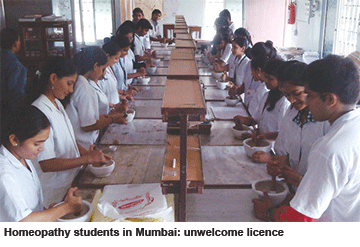 THE APPROVAL GIVEN BY THE SCAMS-tainted Congress-NCP government of Maharashtra to the Nashik-based Maharashtra University of Health Sciences (MUHS, estb. 1998) to introduce a one-year certificate programme in modern pharmacology, completion of which would licence the state’s 55,000 homeopathic doctors to prescribe allopathic medicines, has evoked a storm of protest from medical associations and medical practitioners in the state (pop. 112 million).
THE APPROVAL GIVEN BY THE SCAMS-tainted Congress-NCP government of Maharashtra to the Nashik-based Maharashtra University of Health Sciences (MUHS, estb. 1998) to introduce a one-year certificate programme in modern pharmacology, completion of which would licence the state’s 55,000 homeopathic doctors to prescribe allopathic medicines, has evoked a storm of protest from medical associations and medical practitioners in the state (pop. 112 million).
The state’s medical practitioners’ fraternity has vehemently protested the decision taken without consultation with statutory medical education authorities or representative organisations of doctors. They allege that approval of this bridge study programme is “politically motivated” to boost dwindling enrolments in the state’s 46 homeopathic colleges, 29 of which are owned by politicians, and is tantamount to “legalising quackery”. Recently the Maharashtra chapter of The Indian Medical Association (IMA) and five medical practitioners associations including the Maharashtra Medical Council (MMC) and General Practitioners Association, filed a writ petition in the Bombay high court challenging the state government’s decision.
“Ayurveda and unani medical practitioners in the state have been allowed to prescribe allopathic medicines since 1992, and their syllabi includes key allopathy components including modern pharmacology. However, homeopathy doesn’t teach allopathic pharmacology at all, which is why the course has been introduced. Given the shortage of allopathy doctors in rural areas, and established success of AYUSH (ayurveda, yoga naturopathy, unani, siddha and homeopathy) doctors in filling the gap, and since most homeopaths have been practicing allopathy anyway, this is the way to give the practice more credibility,” says Dr. Kuldip Kohli, former director of AYUSH, whose appointment in 2008 was overruled by the Bombay high court and Maharashtra Administrative Tribunal (MAT) which disqualified him from holding office.
Allopathic medicine practitioners are especially outraged. Comments Dr. Prof. Kishor Taori, chairman, MMC — a statutory body established under the Maharashtra Medical Council Act, 1965: “As per the Indian Medical Council Act, 1956, and the Maharashtra Medical Council Act, 1965, ‘crosspathy’ is not permitted. Pharmacology is a serious science and cannot be taught in one year, and MBBS students study the subject continuously for 4.5 years. Moreover, allopathy and homeopathy are entirely separate medical sciences with contradictory philosophies. Neither MMC nor IMA will permit the registration of such practitioners, nor will Central Council of Homeopathy (CCH).Without registration, graduates of the certificate programme who prescribe allopathic drugs and formulations will be doing so illegally.”
However, according to Dr. B. Shah, administrator of the Maharashtra Council of Homeopathy (MCH), the decision is justifiable as MBBS (allopathy) doctors are reluctant to work in rural areas or even as family physicians. “In rural Maharashtra the great majority of private practitioners are ayurvedic and homeopathic doctors. So they ought to be trained to dispense allopathic medicines,” says Shah.
With Maharashtra, the country’s second most populous state with a current doctor-people ratio of 1:1,382 requiring at least 300,000 doctors to attain the ratio of 1:350 of the US, quite obviously there’s an urgent need to get modern drugs and formulations to do their magic in rural areas. But it’s a moot point whether licensing hastily trained practitioners of alternative systems of medicine to prescribe strong allopathic drugs is the appropriate medicine.
Sunayana Nair (Mumbai)